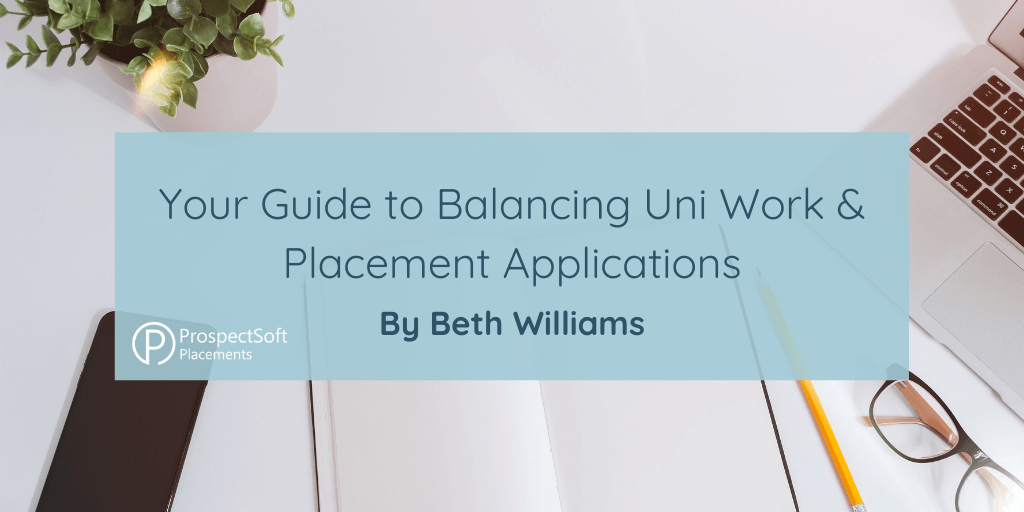By Beth Williams on Wed 21 April 2021 in Placement Blog

Check out our guide for some top tips on how to effectively balance both Uni work and placement applications!
Second year of University has the potential to be one of the best – you may be living in a pricey student house, but hopefully you’re surrounded by a great group of friends who are just as excited as you are to get back to Uni life. And, after a (long) summer back with the rents, you’re likely feeling more than ready to get your independence back and get stuck into second year (after a dose of re-freshers, of course!).
Second year is tonnes of fun (we’re talking from experience here) – you’ve got a new house, a trip to Ikea on the agenda, and a sense of what to expect in the year ahead. But it’s also true that this year comes with a greater set of responsibilities – and no, we don’t just mean sorting out your water bills.
The prospect of completing your assignments alongside searching for your dream placement may feel a little intimidating to say the least. But don’t panic, because we’ve been there before, and we’re here to guide you through the often-tricky task of balancing your Uni work and securing that perfect year in industry.
Start Early
Whatever you do, don’t leave things until the last minute – this goes for both assignments and applications! Whilst leaving everything to the 11th hour may have been weirdly exciting in first year, it’ll become a bad habit you can’t kick in year 2 (and your grades actually count).
Although it may sound ridiculously early and far too efficient, it’s a good idea to start thinking about placements during the summer months before second year (yup, that early...trust us). Some of the most popular schemes close before Christmas, and even if the deadline is a way off, it’s worth spending a spare week or two towards the end of the summer thinking about what sort of placement experience you want, and how that might fit into your career plan. Start off with RMP’s site – it’s the place for finding a placement. You can filter by stuff like industry, location, and check out reviews from previous placements to a get a real insight into the company culture. Some companies even have “Register Your Interest” buttons so you get reminders on when they go live with their opportunities.
This preparation won’t go a miss – it means you’ll be able to roll into second year already having at least a rough idea of what you’re looking for in a potential placement. In other words, you’ll already be ahead of the game, and you’ll thank yourself later!
Quality Over Quantity
You probably realise that although there are 100s (literally 100s) of placements you’d like to apply for, blasting out applications for anything and everything is not advised. It’s not a sustainable approach to securing a great placement.
The thing is, when it comes to placement applications and balancing Uni work, it’s just not realistic to expect yourself to apply to 100s of roles. Which is where that saying “quality over quantity” comes in.
It’s much better to identify a handful of roles you’re really passionate about and focus on them, rather than spread yourself too thin and submit loads of generic applications. This way, you’ll have more time to properly tailor your application, which will in turn give you a much better chance of securing one.
Make Organisation your New Best Friend…
When applying for a real job and studying for a degree, it’s vital that being organised becomes second nature to you. Whilst it’s true that first year will have helped prepare you for the years ahead, there’s definitely a noticeable step-up in terms of the quantity and the expected quality of work – because like it or lump it, second year is when it really counts.
So, it’s time to break out those Excel skills, dust off your diary (or go buy one), and get organised. You’ll feel so much better for it. Be sure to note down any assignments and application deadlines in your calendar, and schedule in time during the Uni week to focus solely on placement applications. This means you won’t be battling between assignments and applications at the same time, and it’ll allow for a stronger focus on each task individually.
Once you’ve got a system that works for you up and running, add any roles you’re really interested in to your spreadsheet, along with the deadline and application details. This is key in ensuring you don’t forget any details, and helps you know exactly what stage you’re at in the process (particularly helpful when you get a call from an employer with an update on your application!) and will help you prioritise tasks. This is also essential for when you’re in the thick of placement applications, since you’ll be able to track your progress for each application, right through from sending your CV off, to telephone interviews and assessment centres.
Utilise your University’s Careers Service
It’s likely that your University is on hand to help with all-things placement related – so be sure to make the most of their knowledge and expertise. Many Careers Services offer consultations and guidance to students looking for work experience, and they have plenty of advice to offer – from tips and tricks on perfecting that CV, to preparing for Assessment Centres. Use this service! Getting a degree certainly isn’t cheap nowadays, so make the most of their knowledge, ask questions and utilise any services that will aid you in securing your dream placement.
Looking for a great placement? How about a getting a hands-on role at the most awarded SME in the UK? Check out our award-winning placement opportunities in Sales, Customer Success, Marketing, Technical Services & Software Development right here!